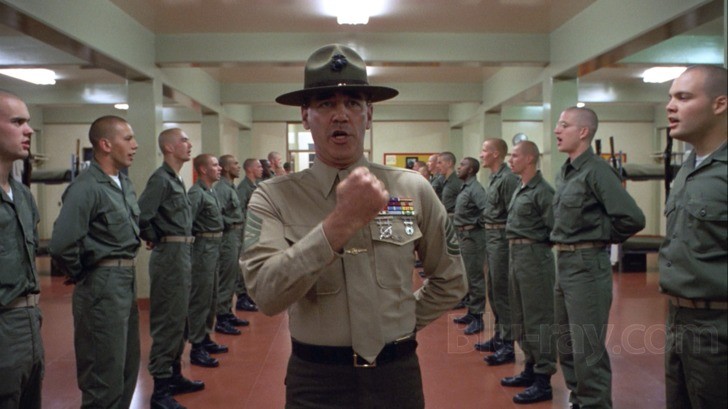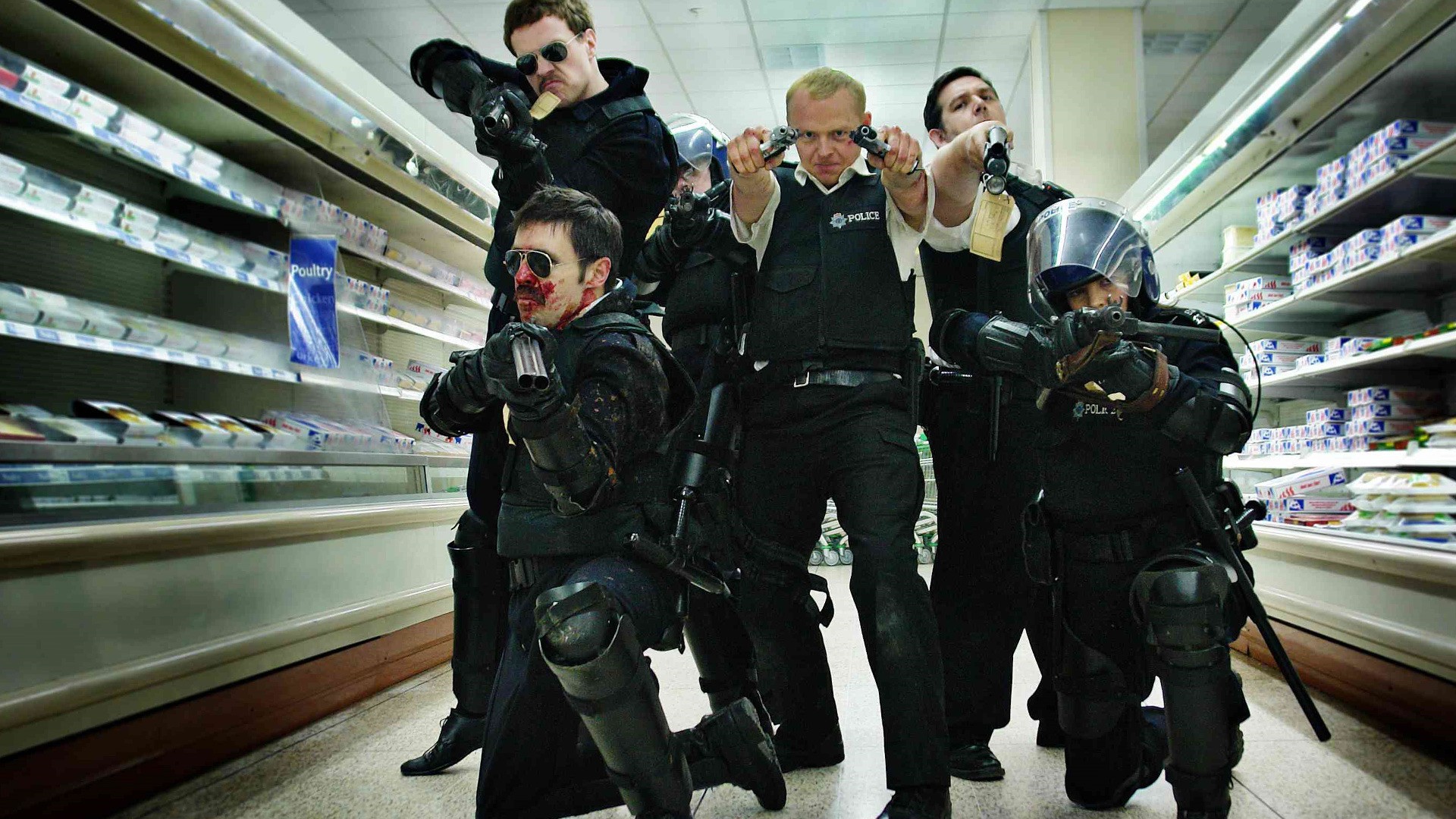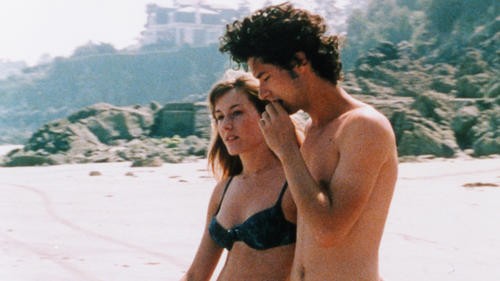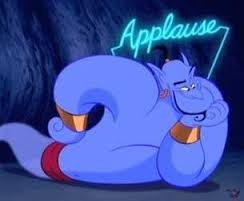
Full Metal Jacket (1987; dir. Stanley Kubrick)—Kubrick is a cable television hypnotist; stop to watch a scene or two, and the next time you check your watch, two hours of your life have vanished. Part of this comes from Kubrick’s distinctive mixture of precision imagery and ambiguous human agents; his shifty films, which often concern the breakdown of orderly systems, always feel like you can eventually figure them out if you could just see them one…more…time. Like The Shining, Full Metal Jacket is a horror film, but it’s more matter-of-fact about the world’s terrible things than its predecessor. Its main subject is the way people like Matthew Modine’s Private Joker and Vincent D’onofrio’s Private Pyle are ground up in the human being lawnmower that is the U.S. military-industrial complex, embodied in the film by R. Lee Ermey’s mad-god drill instructor. Ermey’s florid, obscene litanies of abuse, which he delivers nonstop at maximum volume, coexists uneasily with Kubrick’s tightly composed images of military harmony, including a shot of Marines climbing ropes in the twilight as beautiful as anything in a Miyazaki film. For most viewers, Jacket’s merciless first forty-five minutes overshadow the film’s second half, which takes place in Vietnam and includes a little thing called the Tet Offensive. But it shouldn’t: one look at Animal Mother’s 1000-yard stare ought to keep you locked in. And in the age of CGI, Kubrick’s meticulous craftsmanship stands tall. Just think; they had to set those building on fire during the battle scenes every single day. Grade: A+

Hot Fuzz (2007: dir. Edgar Wright)— Edgar Wright is another filmmaker who stops me in my tracks whenever I’m idly channel-surfing. Hot Fuzz, about a London supercop (Simon Pegg) who thinks something fishy is going on in the small English village where he’s been reassigned, is the only action-comedy anyone needs to see, a triumph of verbal and visual wit more immediately accessible than anything Wright, Pegg and co-star Nick Frost have done so far. But for genre connoisseurs interested in a bit of fun, this pastiche offers endless treasures. Its network of cross-references and allusions are bewildering, edifying, inspirational: the Lethal Weapon theme music, the Silent Rage lookalike who can only say “Yarp”, the Straw Dogs shotgun violence played off as a joke, the casting of The Wicker Man’s Edward Woodward as the town’s security head, all the songs from The Kinks Are The Village Green Preservation Society, the A-Team like way in which the bad guys aren’t killed. To say nothing of Timothy Dalton as the guiltiest-looking, most shamelessly wicked murder suspect in film history. Grade: A+

A Summer’s Tale (1996; dir. Eric Rohmer)—Although Eric Rohmer’s funny, lovely romance about the romantic adventures of a young man and three women had its long-overdue U.S. theatrical premiere earlier this year, it isn’t coming to Memphis; looks like Kansas City (where it’s currently playing) is as close as it’s going to get. This is a shame, because this is perfect mid-August fare, a chatty couple of hours that records, with grace and equanimity, all the dumb games people play when they’re too young and uncertain to deal with love, sex and commitment. I don’t tend to look to Robert Louis Stevenson for advice about today’s youth, but he’s spot-on about the central dilemma of the clueless dude at the film’s center: “He does not yet know enough of the world and men. His experience is incomplete… He is at the experimental stage; he is not sure how one would feel in certain circumstances; to make sure, he must come as near trying it as his means permit.” Out of such hesitations and feints are authentic feelings and many painful memories born. Grade: A

Post Tenebras Lux (2012; dir. Carlos Reygadas)—There’s too little to hold onto in Reygadas’ emotional autobiography, for which he won the Best Director award at the 2012 Cannes Film Festival. Its internal logic remains opaque, and its few potent-looking individual vignettes fail to compensate for its many dead spots. I liked the two visits by the devil (I think) and the scene where the guy rips his own head off, but the rest of the imagery and emotions were either hidden or buried. I feel sorta dopey disliking this movie, though. It’s easy to tee off on typical Hollywood product because village-idiot brainlessness is often what it’s selling. It’s tougher to take down something “challenging” or difficult or unconventional. Because these works may require more time and effort for viewers to unpack it mysteries and challenges, you feel like a chump and a simpleton when you finally give up and say, “I don’t get it.” But I don’t get it. Grade: B-

“Friend Like Me,” from Aladdin (1992; dirs. Ron Clements and John Musker)—I didn’t discover Robin Williams’ soul while watching The Fisher King or Good Will Hunting; I discovered it in a Disney cartoon. The connection between creativity and solitude—and the way in which Williams’ manic flights of free-associative fancy frequently exhausted other people whenever he escaped from the prison of his own head—is the subtext of Williams’ Genie’s mantra: “Phenomenal cosmic power, itty-bitty living space.” Nevertheless, Williams’ magical wish-granter is his greatest role, in part because it best embodies the radical notion of the comedian as world-builder. Wonder, joy and generosity in the movies are all too rare, but these things are all present in this gloriously surreal, genially self-indulgent two and a half minute musical number, which still delights me after dozens of viewings. (Favorite moment: the way the Genie leers, “Well, lookie here!” after conjuring up a tiny harem for his new master.) Before bursting into song, the Genie declares “I don’t think you quite realize what you’ve got here”; that purely expository line will assume new shades of meaning and gravity as we continue to grapple with Williams’ huge (and often frustrating) artistic legacy. Grade (musical number only): A+